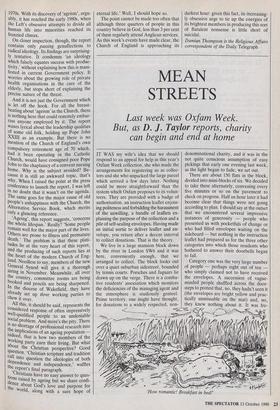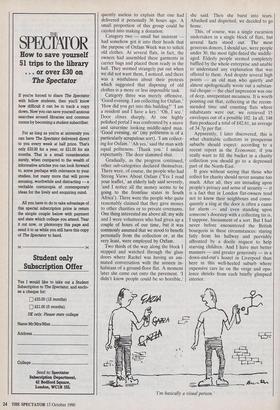MEAN STREETS
Last week was Oxfam Week.
can begin and end at home
IT WAS my wife's idea that we should respond to an appeal for help in this year's Oxfam Week collection, she who made the arrangements for registering us as collec- tors and she who unpacked the large parcel which arrived a few days later. Nothing could be more straightforward than the system which Oxfam proposes to its volun- teers. They are provided with a badge of authorisation, an instruction leaflet enjoin- ing politeness and forbidding the harassment of the unwilling, a bundle of leaflets ex- plaining the purpose of the collection and a pile of self-sealing envelopes. Having made an initial sortie to deliver leaflet and en- velope, you return after a decent interval to collect donations. That is the theory.
We live in a large mansion block down by the river in London SW6 and it was here, conveniently enough, that we arranged to collect. The block looks out over a quiet suburban sidestreet, bounded by tennis courts. Porsches and Jaguars lie drawn up on the verge. There is a comba- tive residents' association which monitors the deficiencies of the managing agent and the atmosphere is studiously genteel. Prime territory, one might have thought, for donations to a widely respected, non- denominational charity, and it was in the not quite conscious assumption of easy pickings that early one evening last week, as the light began to fade, we set out.
There are about 150 flats in the block, divided into mini-blocks of six. We decided to take these alternately, convening every five minutes or so on the pavement to check on progress. Half an hour later it had become clear that things were not going according to plan. I should say at the outset that we encountered several impressive instances of generosity — people who presented us with pocketfuls of change or who had filled envelopes waiting on the sideboard — but nothing in the instruction leaflet had prepared us for the three other categories into which those residents who bothered to answer their doorbells began to fall.
Category one was the very large number of people — perhaps eight out of ten who simply claimed not to have received the envelopes. A succession of vague- minded people shuffled across the door- steps to protest that, no, they hadn't seen it (the envelopes are bright yellow and prac- tically unmissable on the mat) and, no, they knew nothing about it. It was fre- `How romantic! Breakfast in bed!' quently useless to explain that one had delivered it personally 36 hours ago. A small proportion of this group could be cajoled into making a donation.
Category two — small but insistent had somehow got it into their heads that the purpose of Oxfam Week was to solicit old clothes. At several flats, in fact, the owners had assembled these garments in carrier bags and placed them ready in the hall. They seemed strangely put out when we did not want them, I noticed, and there was a wistfulness about their protests which suggested that disposing of old clothes is a more or less impossible task.
Category three was merely offensive. 'Good evening. I am collecting for Oxfam.' 'How did you get into this building?' I am a resident and I have a key."Oh, I see.' Door closes sharply. At one highly polished portal I was confronted by a suave and saturnine looking middle-aged man. `Good evening, sir' (my politeness is of a particularly scrupulous sort). 'I am collect- ing for Oxfam.' Ah yes,' said the man with equal politeness. 'Thank you.' I smiled expectantly. The door slammed shut.
Gradually, as the progress continued, other sub-categories declared themselves. There were, of course, the people who had Strong Views About Oxfam (`Yes I read your leaflet,' an elderly lady said severely, 'and I notice all the money seems to be going to the frontline states in South Africa'). There were the people who quite reasonably claimed that they gave money to other charities or to private covenants. One thing interested me above all: my wife and I were volunteers who had given up a couple of hours of our time, but it was commonly assumed that we stood to benefit personally from the collection or, at the very least, were employed by Oxfam.
Two thirds of the way along the block I stopped and watched through the glass doors where Rachel was having an ani- mated conversation with the unseen in- habitant of a ground-floor flat. A moment later she came out onto the pavement. 'I didn't know people could be so horrible,' she said. Then she burst into tears. Abashed and dispirited, we decided to go home.
This, of course, was a single excursion undertaken in a single block of flats, but several facts stood out. The most generous donors, I should say, were people under 30, the most tight-fisted the middle- aged. Elderly people seemed completely baffled by the whole enterprise and unable to understand any explanation that was offered to them. And despite several high points — an old man who quietly and almost apologetically wrote out a substan- tial cheque — the chief impression was one of deep, unrepentant meanness. It is worth pointing out that, collecting at the recom- mended time and counting flats where inhabitants were out, we retrieved 15 envelopes out of a possible 102. In all, 148 flats produced a total of £42.61, an average of 34.7p per flat.
Apparently, I later discovered, this is what charitable collectors in prosperous suburbs should expect: according to a recent report in the Economist, if you really want to fill the bucket in a charity collection you should go to a depressed part of the North-East.
It goes without saying that those who collect for charity should never assume too much. After all, they are intruding upon people's privacy and sense of security — it is a fact that in London flat-owners tend not to know their neighbours and conse- quently a ring at the door is often a cause for alarm — and even standing upon someone's doorstep with a collecting tin is, I suppose, harassment of a sort. But I had never before encountered the British bourgeois in these circumstances: staring fatly from his hallway and peevishly affronted by a docile request to help starving children. And I have met better manners — and greater generosity — in a down-and-out's hostel in Liverpool than here in this well-heeled suburb where expensive cars lie on the verge and opu- lence shrieks from each briefly glimpsed interior.
'I'm basically a visual person.'



























































 Previous page
Previous page